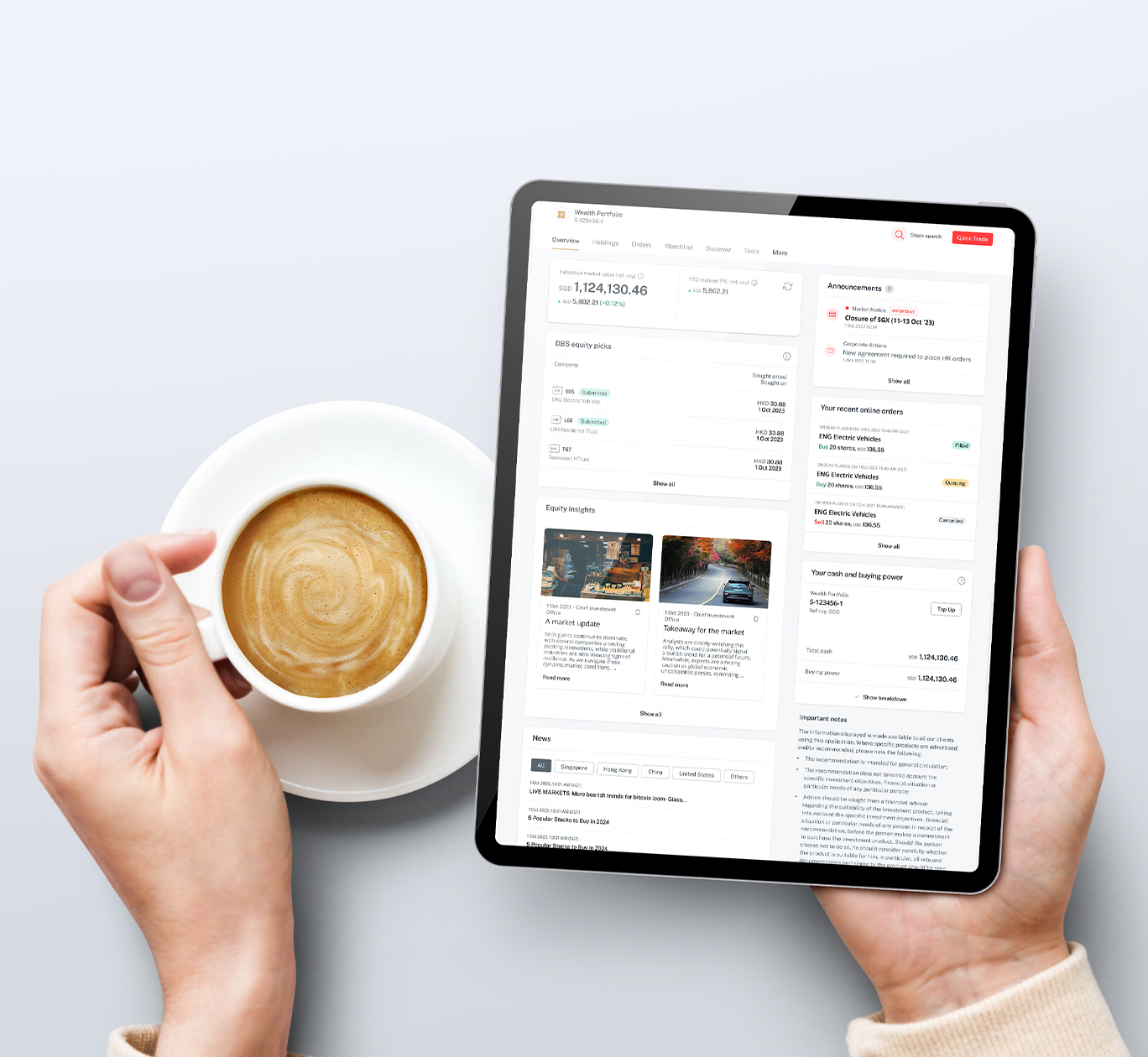Key points:
- Parking monies in your SRS is like sitting around in a gym doing nothing – you’ll earn a 0.05%p.a. deposit rate which isn’t enough to outmuscle inflation.
- Maximise your savings by investing your SRS funds in various investments that suit your risk profile, preferences and time horizon.
- Any gains you make on your SRS investments will automatically be deposited into your SRS account. These gains are tax-exempted until you decide to withdraw the money.
For a customised plan to make the most of your SRS savings
Parking funds inside your Supplementary Retirement Scheme (SRS) account without doing anything else is like sitting idly in a gym. You’ll earn a paltry 0.05% return, which isn’t enough to outmuscle inflation.
To better prepare for retirement, work your SRS savings harder. Make the most out of them by selecting a workout that suits your risk profile and preferences, from among the variety of assets and investments available: from stocks to single premium insurance.
Whichever you choose, the investment returns will be tax-free – 100% of your gains go back into your SRS account.
Here are 5 assets and investments to consider.
SRS in a nutshell
The SRS is a powerful tool scheme that can help you build strong retirement savings.
Contributions are voluntary. Singaporeans and permanent residents can contribute up to S$15,300 a year, and foreigners can contribute up to S$35,700 a year.
Not only do these deposits lower your taxable income, you’ll also get a 50% tax concession on your withdrawal sum when you withdraw the funds at or after your retirement age*. If you withdraw your SRS funds before your retirement age*, the entire withdrawn sum will be taxed and you will face a 5% penalty.
If you have some SRS funds tied up in investments and prefer not to withdraw your them in cash, you can apply to your SRS operator to withdraw an SRS investment by transferring it out of your SRS account (e.g. into your personal Central Depository (CDP) account), without having to liquidate your SRS investments.
* Statutory retirement age that was prevailing when you made your first SRS contribution

Tone up your balance with fixed deposits
A simple, effective way to get started is with fixed deposits (FDs), which usually offer higher interest than traditional savings accounts.
Some opt to augment their FD returns by investing in foreign currency FD, which could offer additional returns from exchange rate movements. This strategy can however be a double-edged sword as the foreign currency FD could be worth more (or less) when converted back to Singapore dollars at maturity. This happens because currency rates change.
(Read more: How currency exchange rates affect investments)

Rates used are hypothetical and based on recent rates.

Get into a regular, steady pace with bonds
With its relative safety and regular coupons, bonds can help to build up your SRS savings in the long term.
By buying them, you’re lending money to the government or a corporate borrower. That being the case, you’ll know what to expect throughout the duration of your investment.
Types of bond-related investments
Retail bonds* | Traded on the Singapore Exchange (SGX), typically in minimum trade sizes of 1,000 units. Interest rates are usually fixed. |
Bond unit trusts or exchange traded funds (ETFs) | An investment manager invests your money in bonds for you. Returns may vary. |
Issued by the Singapore government, they can be purchased for as little as S$500. Returns are fixed, increase over time, and can be redeemed without penalty. |
*via DBS Vickers account
Regardless of which you choose, you’ll be able to get your returns up to speed predictably with regular income.

Tap into expertise with unit trusts and ETFs
These are quick ways to set up a portfolio that’s managed by expert professionals. Depending on your needs, you can choose one that’s actively-managed (unit trusts) or passively-managed (ETFs that track an index).
Put together by professional fund managers, both offer diversification for relatively small amounts by pooling your money with that of other investors.
With unit trusts (also known as funds), managers select stocks and bonds with the aim of outperforming their benchmark.
ETFs meanwhile buy securities to copy a specific market index such as Singapore’s Straits Times Index. Hence, their costs are generally lower.

Power up performance with stocks
If you’re prepared to accept more risk, consider stocks.
Buying them lets you own a part of a business. While stock prices will fluctuate, you’ll share in its profits through dividends, and its growth through stock price gains.
Before buying, it’s important to do your research and get proper advice. Check out the stocks’ balance sheet strength, earnings outlook and valuations. Sometimes, undervalued stocks can offer great value.
If you’re considering real estate investment trusts (REITs), look at the quality of the properties under their care as well as the dividend yield.

Lock in long-term benefits with single premium insurance
For those who want the assurance of continuing income, a one-time payment into a a single-premium insurance endowment policy that is SRS approved could be all that’s needed. You can purchase these using your SRS funds.
How Single Premium Insurance works

Other SRS benefits
Your SRS account also offers other benefits that could be useful as you get yourself into a healthy financial position.
Benefits of SRS account | Details |
|---|---|
Withdraw funds any time you need to | 5% early withdrawal penalty applies if you withdraw before the prescribed retirement age. |
50% tax concession on withdrawals after the prescribed retirement age | You can minimise the amount of tax paid. Only 50% of withdrawals will be taxed at the prevailing tax rate after you reach the prescribed retirement age. |
Potentially lower your after-retirement tax even more | You can spread withdrawals over 10 years, taking only what you need as income. This could help you to move down income brackets and minimise taxes even further. |
Explore getting your SRS account into healthier shape. Not only are there many good reasons to save with SRS, there are also many good ways to make your SRS savings work harder for you.
For a customised wealth growth plan that looks at your SRS savings, investments, and insurance.
Disclaimers and Important Notices
This article is for information only and should not be relied upon as financial advice. Any views, opinions or recommendation expressed in this article does not take into account the specific investment objectives, financial situation or particular needs of any particular person. Before making any decision to buy, sell or hold any investment or insurance product, you should seek advice from a financial adviser regarding its suitability.
Singapore dollar deposits of non-bank depositors and monies and deposits denominated in Singapore dollars under the Supplementary Retirement Scheme are insured by the Singapore Deposit Insurance Corporation, for up to S$100,000 in aggregate per depositor per Scheme member by law. Monies and deposits denominated in Singapore dollars under the CPF Investment Scheme and CPF Retirement Sum Scheme are aggregated and separately insured up to S$100,000 for each depositor per Scheme member. Foreign currency deposits, dual currency investments, structured deposits and other investment products are not insured.







